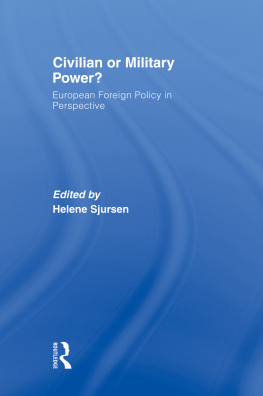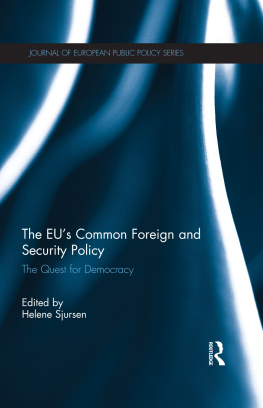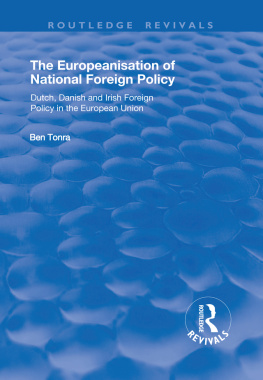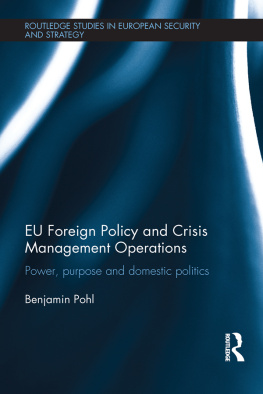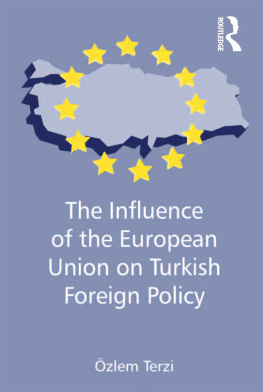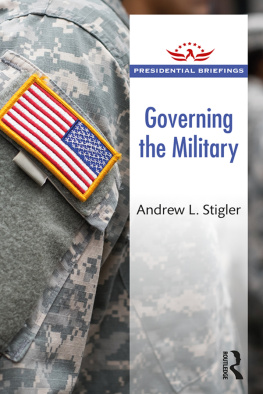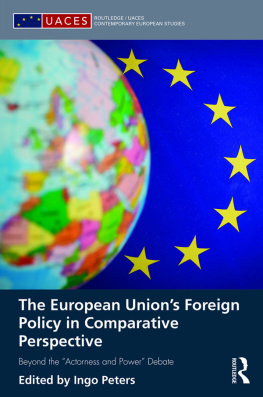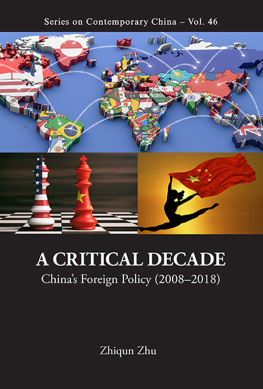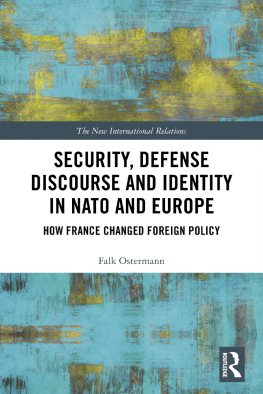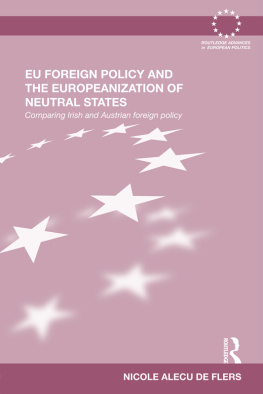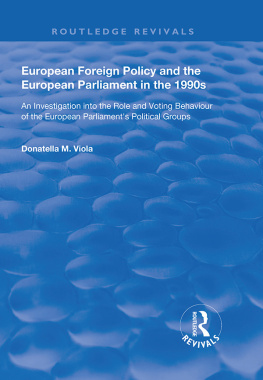Civilian or Military Power?
This text critically examines the belief that the EU not only has an impact on the international system but also a normative, civilian and civilising power. The contributors question whether this assertion fits with the empirical record, or is merely based on anecdotal evidence and whether there is a theoretical basis for the expectation of a normative or civilising power. Moving the research agenda forward, the book establishes criteria and assessment standards for examining the EUs international role and its putative normative dimension. Such an endeavour is particularly important against the backdrop of recent developments in European security and defence. The acquisition of military means, or the EUs ambition to acquire such means, might weaken at least the argument that the EU is a civilian power and could provoke a shift towards a policy more akin to traditional great powers.
This book was previously published as a special issue of the Journal of European Public Policy.
Helene Sjursen is Senior Researcher at Arena Centre for European Studies, University of Oslo, Norway. She has written extensively on international relations, in particular on the foreign and security policy of the European Union, and on the question of EU enlargement.
Journal of European Public Policy Series
Series Editor: Jeremy Richardson is a Professor at Nuffield College, Oxford University
This series seeks to bring together some of the finest edited works on European Public Policy. Reprinting from Special Issues of the Journal of European Public Policy, the focus is on using a wide range of social sciences approaches, both qualitative and quantitative, to gain a comprehensive and definitive understanding of Public Policy in Europe.
Towards a Federal Europe
Edited by Alexander H. Trechsel
The Disparity of European Integration
Edited by Tanja A. Brzel
Cross-National Policy Convergence:
Causes Concepts and Empirical Findings
Edited by Christoph Knill
Civilian or Military Power?
European Foreign Policy in Perspective
Edited by Helene Sjursen
Civilian or Military Power?
European Foreign Policy in Perspective
Edited by Helene Sjursen
First published 2007 by Routledge
2 Park Square, Milton Park, Abingdon, Oxon, OX14 4RN
Simultaneously published in the USA and Canada
by Routledge
270 Madison Ave, New York, NY 10016
Routledge is an imprint of the Taylor & Francis Group, an informa business
Transferred to Digital Printing 2009
2007 Taylor & Francis Ltd
Typeset in FranklinGothic, Garamond by Techset Composition Limited
All rights reserved. No part of this book may be reprinted or reproduced or utilised in any form or by any electronic, mechanical, or other means, now known or hereafter invented, including photocopying and recording, or in any information storage or retrieval system, without permission in writing from the publishers.
British Library Cataloguing in Publication Data
A catalogue record for this book is available from the British Library
Library of Congress Cataloging in Publication Data
A catalog record for this book has been requested
ISBN 10: 0-415-38048-0 (hbk)
ISBN 10: 0-415-56853-6 (pbk)
ISBN 13: 978-0-415-38048-5 (hbk)
ISBN 13: 978-0-415-56853-1 (pbk)
Contents
Helene Sjursen
Ian Manners
Wolfgang Wagner
Adrian Hyde-Price
Helene Sjursen
Erik Oddvar Eriksen
Jennifer Mitzen
Federica Bicchi
Marika Lerch and Guido Schwellnus
Michael Smith
Helene Sjursen1
INTRODUCTION
In the past decade the view of the European Union (EU) as a relevant and important international actor has gained increasing acceptance. The EU is the worlds largest trading power as well as a major donor of humanitarian assistance and development aid. This, together with the fact that it is gradually building capabilities in security and defence, does indeed make it difficult to neglect the EUs international role. Consequently, whereas much attention was traditionally paid to the question of whether or not there is such a thing as a European foreign policy (Bull 1982; Hoffmann 2000), analysis now tends to ask what characterizes this European foreign policy. In this context, a number of authors have stressed the particularity of the EU. In developing their argument, they often build on Franois Duchnes (1972) conception of the EU as a civilian power. According to Duchne, the particularity of the EUs international role is linked to the nature of the polity itself. In his view, the EUs strength and novelty as an international actor is based on its ability to extend its own model of ensuring stability and security through economic and political rather than military means. A number of authors have picked up on this idea and developed it further. What they have in common is an interest in a putative normative dimension to the EUs foreign and security policy (Rosencrance 1998; Whitman 1998; Stavridis 2001; Smith 2000; Manners 2002; Delcourt 2003; Aggestam 2004; Diez 2004; Light-foot and Burchell 2005). The argument in this literature tends to be that the EU is distinguished from other actors because it is not only a civilian power (in the sense that it does not have military instruments at its disposal) but (also) a normative, civilizing or ethical power within the international system.
On the one hand, the conception of the EU as a normative/civilizing power has provided a fruitful avenue for research, which has moved the agenda a step forward. It has not only taken the debate beyond the often rather sterile discussion on whether or not the EU actually has a foreign policy, but it has also gone further than the more policy-oriented studies, which assess the strengths and weaknesses of institutional arrangements and their consequences for policy effectiveness. It raises different and important questions about the foreign policy of the EU and the role this actor which is less than a state and more than an international organization can and does play in international relations. Many of the observations about the EUs putative normative power also connect to broader debates in international relations and foreign policy. They have particular relevance for the discussion of the evolution of the international system towards a post-Westphalian order where state sovereignty is constrained through legal developments beyond the nation state.
On the other hand, such descriptions of the EU also raise a number of new questions. The conception of the EU as a normative, ethical and particularly a civilizing, power is contested not least because this conception is very similar to that used by EU officials when describing the EUs international role. This leaves researchers vulnerable to the charge of being unable to distinguish between their own sympathy for the European project and their academic role as critical analysts. In order to assess if such conceptualizations of the EU are simply co-optations of the agenda of those in power, it is important to investigate whether these claims fit with the empirical record or are merely based on anecdotal evidence. More fundamentally, however, analyses should contribute to a better grasp of the nature of the EUs external policies as well as the nature of the beast itself (Risse-Kappen 1996). In order to contribute to such an endeavour, we have sought to address the following three questions:


